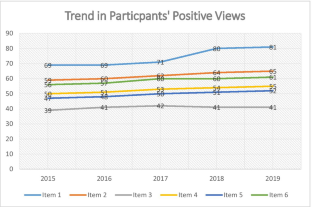Abstract
This study sought to determine the relationship between leadership and managerial practices from over 615,395 respondents at 83 U.S. Federal agencies. The theoretical framework was informed by Goleman’s theory, the Bar-On model theory, and identified a research gap that could be addressed through emotional intelligence (EI) by calculating the standard deviation of positive responses between 2015 and 2019. The research established the mean for the respondent’s views on leadership and managerial practices was 51.53. The standard deviation for the respondents was 11.78. Thus, revealing an increase in positive responses among employees and identified that EI improves leadership and managerial practices.

Similar content being viewed by others
Change history
22 September 2021
A Correction to this paper has been published: https://doi.org/10.1007/s11115-021-00563-z
References
Aggarwal, C. C. (2015). Outlier analysis data mining. Cham: Springer.
Almatrooshi, B., Singh, S. K., & Farouk, S. (2016). Determinants of organizational performance: A proposed framework. International Journal of Productivity and Performance Management, 65(6), 844–859.
Androniceanu, A. (2017). The three-dimensional approach of total quality management, an essential strategic option for business excellence. Amfiteatru Economic, 19(44), 61–78.
AVCI, Y. Y. (2018). Investigation of Richard Bach’s Work Named Seagull Jonathan Livingston in point of Elements Given in Daniel Goleman’s Study “Emotional Intelligence” 12. Educational Sciences Research in the Globalizing World, 491.
Bratton, V. K., Dodd, N. G., & Brown, F. W. (2016). The impact of emotional intelligence on accuracy of self‐awareness and leadership performance. Leadership & Organization Development Journal.
Chang, T. Z., Chen, S. J., & Chiou, J. S. (2015). Management leadership behavior and market orientation: The relationship and their effects on organization effectiveness and business performance. In Marketing, technology and customer commitment in the new economy. Cham: Springer.
Drigas, A. S., & Papoutsi, C. (2018). A new layered model on emotional intelligence. Behavioral Sciences, 8(5), 45.
FEVS- Federal Employee Viewpoint Survey (2019). Retrieved December 8, 2019, from https://www.opm.gov/fevs/public-data-file/
Hultin, M. (2011). Emotional intelligence: The three major theories in the field. Retrieved 26 February 2021, from https://www.diva-portal.org/smash/get/diva2:431846/FULLTEXT01.pdf
Issah, M. (2018). Change leadership: The role of emotional intelligence. Education, 8(3). Retrieved 26 February 2021, from https://journals.sagepub.com/doi/full/https://doi.org/10.1177/2158244018800910
Kahtani, A.A. (2013). Employee emotional intelligence and employee performance in the higher education institutions in Saudi Arabia: A proposed theoretical framework. International Journal of Business and Social Science, 4(9). Retrieved 26 February 2021, from http://ijbssnet.com/journals/Vol_4_No_9_August_2013/7.pdf
Kanesan, P., & Fauzan, N. (2019). Models of emotional intelligence: A review. e-Bangi, 16(7).
Kumar, S., Adhish, V. S., & Chauhan, A. (2014). Managing self for leadership. Indian journal of community medicine : official publication of Indian Association of Preventive & Social Medicine, 39(3), 138–142. Retrieved 26 February 2021, from https://doi.org/10.4103/0970-0218.137148
Lubbadeh, T. (2020). Emotional intelligence and leadership–the dark and bright sides. Publishing House of Rzeszow University of Technology, 39.
Maqbool, R., Sudong, Y., Manzoor, N., & Rashid, Y. (2017). The impact of emotional intelligence, project managers’ competencies, and transformational leadership on project success: An empirical perspective. Project Management Journal, 48(3), 58–75.
Md-Nawi, N.H., Redzuan, M., Hamsan, H. & Md-Nawi, N.H. (2017). Emotional intelligence (self-awareness, self-management, social awareness and relationship management) and leadership behavior (transformational and transactional) among school educator leaders. Int. J. Educ. Stud. 04(02). 37–47. Retrieved 26 February 2021, from https://journals.esciencepress.net/index.php/IJES/article/download/1593/1027
Norboevich, T. B. (2020). Analysis of psychological theory of emotional intelligence. European Journal of Research and Reflection in Educational Sciences, 8(3), 99–104.
Ovans, A. (2015). How emotional intelligence became a key leadership skill. Retrieved 7 December 2019, from https://hbr.org/2015/04/how-emotional-intelligence-became-a-key-leadership-skill.
Pastor, I. (2014). Leadership and emotional intelligence: the effect on performance and attitude. Procedia Economics and Finance, 15(2014). 985 – 992. Retrieved 26 February 2021, from https://core.ac.uk/download/pdf/82112799.pdf
Samad, H.A. (2014). Emotional intelligence the theory and measurement of EQ. European Scientific Journal, 2. Retrieved 26 February 2021, from https://core.ac.uk/download/pdf/236418224.pdf
Trivisonno, M., & Barling, J. (2016). Organizational leadership and employee commitment. Edward Elgar Publishing.
Author information
Authors and Affiliations
Corresponding author
Additional information
Publisher's Note
Springer Nature remains neutral with regard to jurisdictional claims in published maps and institutional affiliations.
The original online version of this article was revised: The original version of this article has an incorrect copyright holder.
Rights and permissions
About this article
Cite this article
Gransberry, C.K. How Emotional Intelligence Promotes Leadership and Management Practices. Public Organiz Rev 22, 935–948 (2022). https://doi.org/10.1007/s11115-021-00550-4
Accepted:
Published:
Issue Date:
DOI: https://doi.org/10.1007/s11115-021-00550-4




